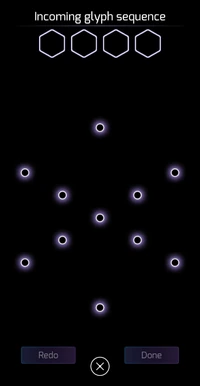
Level 6/Level 7 Portal
Glyph Hacking, also known as glyphing or glacking[1], is an extended version of hacking accessible through a Portal's info card.[2] Agents must successfully trace out certain Glyphs in the given amount of time to acquire additional items and earn bonus AP for each Hack.
In Ingress lore, the Glyph sequences were authored by the Shapers and provide insight into their mentality, motivation, and goals.
Overview[]

The hacking menu in Prime. Agents can request a Portal Key  , request no Portal Key
, request no Portal Key  , or initiate a Glyph Hack.
, or initiate a Glyph Hack.
| Hack Level |
Number of Glyphs |
Countdown Timer |
Perfect Glyph Bonus |
Glyph Points |
|---|---|---|---|---|
| L1 | 1 | 20s | 28 % | 1 |
| L2 | 2 | 20s | 40 % | 2 |
| L3 | 3 | 20s | 55 % | 4 |
| L4 | 3 | 19s | 55 % | 4 |
| L5 | 3 | 18s | 55 % | 4 |
| L6 | 4 | 17s | 80 % | 8 |
| L7 | 4 | 16s | 80 % | 8 |
| L8 | 5 | 15s | 163 % | 15 |
To initiate a Glyph Hack, an Agent taps a Portal within their Area of Influence to invoke its info card. Holding the ![]() 'Hack'-button and then selecting the Glyph Hack-option by sliding onto the
'Hack'-button and then selecting the Glyph Hack-option by sliding onto the ![]() Glyph-icon initiates the Glyph Hack and opens the
Glyph-icon initiates the Glyph Hack and opens the Command Channel.
The Agent will be shown between one to five Glyphs, depending on the level of the Portal or Agent, whichever is lower. The Agent must then trace the Glyphs into the 11-dot array one by one, repeating the sequence exactly. If the Agent makes a mistake in retracing the Glyphs, he or she may redo the Glyph by pressing the "Undo"-button at the lower left corner. While the sequence of Glyphs Agents are shown during Glyph hacking ranges in length between one and five, proper Glyph sequences contain between three (L3-L5) and five Glyphs (L8) and convey a certain message to the Agent.
Each successfully-drawn Glyph causes the Portal to make bonus item rolls and produce more items. If every Glyph is entered correctly before the countdown elapses, the Glyph bonus will be increased further, and a speed bonus proportional to the remaining time will be applied.[2] The Agent then receives bonus items and standard Hack items separately.
Glyph hacking is subject to the same cooldown and burnout effects of standard Hacks. While completing a Glyph sequence does not guarantee bonus items, nearly all Glyph Hacks will produce some.
Bonus item composition[]
Community studies suggest that the composition of bonus items is identical to that of a standard Hack and that every 30% of Glyph- or speed bonus, rounded up, causes another item roll to be added to the bonus. The rolls are made independently, and the Agent can receive multiple copies of the same Very Rare or sponsored item.
As of version 1.109.0 in November 2016, Portal Keys ![]() are also given as bonuses, meaning it is possible to obtain more than one Portal Key
are also given as bonuses, meaning it is possible to obtain more than one Portal Key ![]() from a Hack.
from a Hack.
AP reward[]
Agents are awarded 50 AP for each correctly-entered Glyph. If the entire sequence is correctly entered, the speed bonus will be applied to the AP reward. This AP is independent of the 100 AP reward for hacking an enemy Portal.
Bypass[]
Tapping the BYPASS button during Glyph hacking abandons the sequence and resolves identically to a standard Hack. If an Agent must rapidly leave Glyph hacking interface, they are advised to instead tap on a grid point to fail the rest of the sequence and receive credit for any correctly-entered Glyphs.
Command Channel[]
Immediately after the Glyph hacking interface is shown, the Agent will see the legend "COMMAND CHANNEL OPEN" and will have some time before the Glyph sequence begins. During this time, the Agent can enter specific commands[1][3]. The currently known commands are the following:
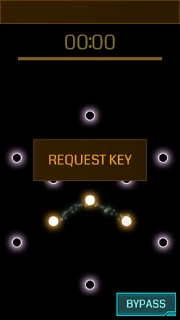
Requesting a key using the MORE-Glyph
 MORE: Requesting keys[]
MORE: Requesting keys[]
Before Ingress version 1.90.1, a hack would not produce a Portal Key ![]() if the Agent was already carrying one for that Portal in their inventory. In order to have multiple Portal Keys
if the Agent was already carrying one for that Portal in their inventory. In order to have multiple Portal Keys ![]() of the same Portal, Agents would drop or store their owned Portal Keys
of the same Portal, Agents would drop or store their owned Portal Keys ![]() in a Capsule
in a Capsule ![]() during hacking.
during hacking.
This tedious process was overcome by the MORE-Glyph. By entering it in the command channel, the hack has a normal chance of producing a Portal Key ![]() , regardless of the amount of Portal Keys
, regardless of the amount of Portal Keys ![]() already owned for that Portal, even if the Glyph sequence was not entered correctly or in time.
already owned for that Portal, even if the Glyph sequence was not entered correctly or in time.
 LESS: Request no key[]
LESS: Request no key[]
Entering the LESS-Glyph, on the other hand, specifically requests for a Portal Key ![]() not to be produced. This is useful when Agents do not want a Portal Key
not to be produced. This is useful when Agents do not want a Portal Key ![]() for the specific Portal. This could be due to several reasons. e.g. inventory limit, or the Portal being owned by the enemy and far from the Agent's normal operating area.
for the specific Portal. This could be due to several reasons. e.g. inventory limit, or the Portal being owned by the enemy and far from the Agent's normal operating area.
 SIMPLE: Slow sequence[]
SIMPLE: Slow sequence[]
Entering SIMPLE command will cause the Glyph sequence to be shown at a slower speed, thus making it easier to memorize and repeat.
 COMPLEX: Fast sequence[]
COMPLEX: Fast sequence[]
On the other hand, the COMPLEX command will generate the opposite effect, and the Glyph sequence will be presented at a faster-than-normal speed. This generates an additional challenge to the Agent but at the benefit of being able to farm faster, or Glyph hack more Portals while travelling on public transport.
Glyph Medals[]
- Main article: Translator
The Translator-Medal recognizes Agents who have mastered the Shaper-Glyphs.
| Bronze | Silver | Gold | Platinum | Onyx |

|

|

|

|

|
| 200 | 2 000 | 6 000 | 20 000 | 50 000 |
Glyphs and Translations[]
- Main article: Glyphs
Each Glyph is associated with one or more translations. The translated words will be revealed after the sequence is completed, regardless of the Agent's performance. There are currently 100 Glyphs, with some appearing more often than others.
The Glyph sequences received by hacking a Portal of Level 2 or higher are not random. Instead, a pre-set sequence is randomly selected from a table. Agents who memorize the sequences and their translations can improve their performance while relieving themselves from having to memorize the shapes on the fly.
The imperfect Glyph[]
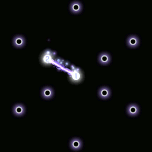
Drawing the IMPERFECT-Glyph
With one exception, all Glyphs are drawn by connecting nodes without backtracking. That is to say, the lines that connect two nodes may cross but never overlap one another or bridge another node.
The ![]()
IMPERFECT-Glyph is the sole exception. To correctly draw the Glyph, the Agent must connect the left node of row 5 directly to the right node of row 3, bypassing the center node at row 4. Then, the Agent must backtrack and connect the right node of row 3 to the center node at row 4, then connect that to the left node of row 5.
History[]
Zero-Second Cheat[]
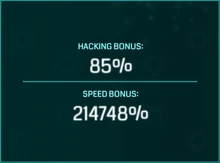
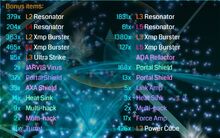
On 04. April 2015, developer Benedikt Allendorf posted screenshots on Google+ showing a Glyph Hack with a speed bonus of 214 748% which produced over 2 000 items.[4]
Allendorf later explained that he had modified the Ingress Scanner app to tell Niantic's servers that he completed the Hack in -20 seconds.
Niantic's servers converted this to a ratio of -1.0. It then cast the negative 32-bit floating-point number into an unsigned 32-bit integer. Because the twos complement representation of a negative number has each bit set to 1, this returned a speed bonus of the maximum 32-bit unsigned integer value of 2 147 483 647. The server divided this by 1 000 to convert from milliseconds and used it to calculate the item drops.
The bug was quickly patched, and the cheat is no longer possible.
HIGH BONUS ENABLED[]
When Glyph Hacking was first introduced, all hack attempts, both Glyph and standard, had a small chance of initiating a HIGH BONUS ENABLED Glyph sequence. Completing the sequence rewarded the Agent with a large number of bonus items while aborting or failing it caused the hack to fail completely and produce nothing.
Although HIGH BONUS ENABLED was mentioned in the official Ingress help pages for a long time, it was removed from the Scanner shortly after its introduction.
References[]
- ↑ 1.0 1.1 "Glyph Hack". Fev Games. Retrieved 30. July 2016.
- ↑ 2.0 2.1 Glyph Hacking – Ingress Help Center Ingress Support, retrieved 21. March 2023.
- ↑ Decodeingress.me - Glyph Hack Command Channel is Open
- ↑ Recently found. Every Developer should recognize the number! ;) For full...
